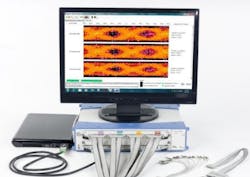Next step in infrared countermeasures development will involve protecting UAVs from missile attack
TUCSON, Ariz., 16 Oct. 2011.Missile-defense experts at the Raytheon Co. (NYSE: RTN) Missile Systems segment in Tucson, Ariz., are offering their Common Infrared Counter Measures (CIRCM) system for a U.S. Army competition to protect combat helicopters and other aircraft by jamming the infrared guidance systems of heat-seeking missiles and diverting the missiles away from the aircraft.Raytheon’s CIRCM will feature the company’s directed infrared countermeasures turret and a rugged quantum cascade laser (QCL). Raytheon officials also are proposing their CIRCM system for protecting unmanned aerial vehicles (UAVs), because the Raytheon CIRCM weighs 15 pounds -- which is small enough for many medium- and large-sized military UAVs such as the Predator and Global Hawk UAVs.Other defense companies developing infrared countermeasures systems to defeat heat-seeking air-to-air missiles include Northrop Grumman Corp., Elbit Systems, ITT Corp., and BAE Systems.Medium- and large-size UAVs "are highly vulnerable to missile attacks," explains Mike Booen, vice president of advanced security and directed energy systems at Raytheon Missile Systems. While Raytheon and other companies specializing in electro-optical sensor systems are concentrating on developing infrared countermeasures to protect cargo aircraft and combat helicopters, "unmanned is the next logical step," Booen says.
Directional infrared counter measures (DIRCM) systems use low-power lasers to confuse the guidance systems of sophisticated missiles and divert them away from aircraft. Once fielded, CIRCM systems will shield the Army's combat helicopters from guided missiles. A contract downselect is expected in early 2012.
For more information contact Raytheon Missile Systems online at www.raytheon.com/businesses/rms.
